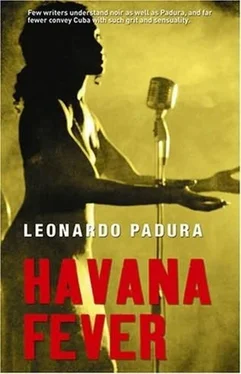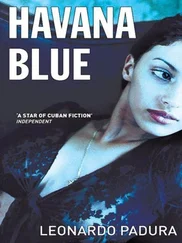Leonardo Padura - Havana Fever
Здесь есть возможность читать онлайн «Leonardo Padura - Havana Fever» весь текст электронной книги совершенно бесплатно (целиком полную версию без сокращений). В некоторых случаях можно слушать аудио, скачать через торрент в формате fb2 и присутствует краткое содержание. Жанр: Триллер, на английском языке. Описание произведения, (предисловие) а так же отзывы посетителей доступны на портале библиотеки ЛибКат.
- Название:Havana Fever
- Автор:
- Жанр:
- Год:неизвестен
- ISBN:нет данных
- Рейтинг книги:3 / 5. Голосов: 1
-
Избранное:Добавить в избранное
- Отзывы:
-
Ваша оценка:
- 60
- 1
- 2
- 3
- 4
- 5
Havana Fever: краткое содержание, описание и аннотация
Предлагаем к чтению аннотацию, описание, краткое содержание или предисловие (зависит от того, что написал сам автор книги «Havana Fever»). Если вы не нашли необходимую информацию о книге — напишите в комментариях, мы постараемся отыскать её.
Havana Fever — читать онлайн бесплатно полную книгу (весь текст) целиком
Ниже представлен текст книги, разбитый по страницам. Система сохранения места последней прочитанной страницы, позволяет с удобством читать онлайн бесплатно книгу «Havana Fever», без необходимости каждый раз заново искать на чём Вы остановились. Поставьте закладку, и сможете в любой момент перейти на страницу, на которой закончили чтение.
Интервал:
Закладка:
Lying on the grass, wracked by the pain issuing from his battered anatomy, Mario Conde realized he couldn’t pinpoint how long he’d needed before finally daring to open his eyes, because in spite of his wishes, only one eye raised its lid, the bare minimum necessary to see that night had fallen and he was alone. He closed his working eye and felt the other, only to find a moist, latent swelling extending from his eyebrow to his cheek. Had they knocked an eye out? he wondered, momentarily forgetting his conversation with the Enlightened One, because thirst and pain were pummelling him, and he felt a desperate desire to cry from his surviving eye. He fought off the pains shooting up his back, knee, stomach, face, the nape of his neck and, especially, from inside his head, pulled himself up and, hands against the ground, rode out a dizzy spell that was regrettably non-alcoholic. From the heart of darkness he saw he was on empty wasteland and a few minutes later glimpsed, 200 metres away, a poorly lit street along which the odd car sped. He wondered if it would be best to crawl to the street, but was afraid he might cut his hands on the broken glass that was no doubt scattered among the grass. He summoned all his energy, pulled himself up on his knees and, holding his battered head, made the supreme effort necessary to totter to his feet as if in one of his most drunken moments. He then realized that he was barefoot and, when he touched his chest, that he was bare-chested too. And what about that eye? Had they really knocked it out?
Twelve falls later, burnt by the thirst searing his throat, with a new sharp pain in the sole of his left foot, the remnants of Mario Conde finally made it to the road, and he saw he was near the silent, rusting power station that cast its gloomy, geometrical shadows over the wasteland. He thought his best option would be to cross the street to the service station and try to locate Yoyi or Manolo from there, but doubted he had the strength to make it that far. Before attempting such a risky crossing he’d have to recoup energy; he flopped to his knees in the grass, and was unable to stop his body from collapsing in the direction of the pavement. He probably lost consciousness as he fell because he felt no pain when his face hit the concrete.
The hand swabbing his sore eyebrow and cheek brought him back into the land of the suffering. The stabbing pains were so severe that the Count struck out.
“Hey, easy does it, Bobby,” said a voice. “They gave you enough to eat and take away… Let me clean you up a bit, then they’ll X-ray you up to your ears.”
Conde realized the voice wasn’t his enlightened friend’s and, imagining he must be in a place as mundane and nasty as a hospital he asked: “Did they knock one of my eyes out?”
“No, it’s still there but in a mess.”
“Who are you?”
“A nurse. The doctor gave you a painkiller and we’re going to stitch you up now.”
“With a needle?” asked the Count, appalled.
“Yes, of course, though you’ve got so many holes we could use a sewing machine… Up you get… now faint again, I’ll start on the eyebrow…”
“Wait a minute… Let me weep a few tears first…”
“All right, but make it quick.”
“Hey, by the way, you ever seen a big guy around here in an orange tunic?”
“Yes, he was round and about, but went off to the carnival. Come on, faint, then I can get on with it.”
Five minutes or hours later the Count moved his eyelids and suspected he really was dead – definitively, unequivocally dead, as if someone had ignored all his sins and he was ascending to heaven, where an angelical voice said: “It’s him, it’s him.”
When he opened his working eye, he could see, from his supine position, Tamara, Candito, Rabbit and Yoyi’s faces: his blurred brain worked out that the voice he’d heard belonged to none of those archangels. He dropped his head to one side and found himself level with the face of Skinny Carlos, leaning forward in his wheel chair.
“Hey, brother, you got one hell of a pasting.”
“You’re kidding, Skinny, they didn’t even take an eye out.”
Mario Conde refused to report the incident. He thought it would be absurd, a sign of softness in the head, to start telling a policeman that some bad guys had kicked him to pulp because he’d poked his nose somewhere he wasn’t invited. Besides, who could he blame for his drubbing apart from himself, his own naivety and stupidity? The unlikely names of Veneno and Michael Jordan were the ones that came to mind as possibly being behind the attack, but lack of proof and his conviction that both would have set up good alibis were grounds enough to see that making a statement would be futile. To cap it all, in the depths of his battered self he felt grateful: they were only telling him he was unwelcome in the barrio and bidding him farewell in their time-honoured manner.
The doctor insisted on keeping him under observation in hospital for a day, but when he discovered nothing was broken, that he’d only severe bruising, soreness and a couple of wounds they’d already stitched on his left eyebrow and behind his right ear, Conde asked to leave and swore an oath – which he conveniently faked by raising his fingers – that he’d inject himself with the prescribed antibiotics. Taking full advantage of his situation, he pretended to turn down Tamara’s suggestion that she could put him up for a few days: why should she bother, he said, if it’s nothing serious, but yielded tamely the first time she insisted.
When he finally saw himself in the mirror, Conde confronted a budding monster he only vaguely recognized. Although the swellings on his eyebrow and cheek had gone down thanks to an intake of anti-inflammatory pills and bags of ice, and he could half-open the eyelid, his eyeball was completely bloodshot and its vision mediated by an opaque film bent on changing his view of the world by painting it pink.
After he’d swallowed a couple of pills, suffered a sharp jab in the buttock and begun to reconcile himself with the world after drinking fresh coffee made by Tamara, Conde slipped into a warm bath and soaked there until it went cold. The peace and elegance, the feeling he was safe and the centre of attention of the woman he’d loved the most and longest, restored his sense of well-being, and he wondered if the whole of his life shouldn’t be like that. However, some difficulty was always lurking ready to divert him from the peace he so desired, as if he were fated to hover between the edge and centre of a whirlpool of doubt.
Keen to make the most of a bad situation, his friends converted his convalescence into a party, rolling up at Tamara’s at ten a.m. Candito and Rabbit had taken turns to push Skinny’s wheelchair fifteen blocks, and when Yoyi arrived he lambasted them for not giving him a call: he’d have driven them all the way in his Chevrolet, listening to his birthday gift from the Count, that selection of hits by Credence Clearwater Revival.
Sheltering under the foliage of the flowering ceiba that dominated Tamara’s patio, they drank cold lemonade out of militant solidarity with their battered friend, Conde, who reeled off possible reasons why he’d been chased so forcefully out of the old barrio of Atarés. Skirting round his flirtation with drugs and his encounter with the pale J.D., he announced he was going back the following day to find the elusive woman whose address he’d finally tracked down.
“You think they beat you up to stop you talking to her?” asked Candito, who, after more than ten years of Christian clean living, still maintained his streetwise knowledge from his time as an urban warrior in the most diverse fields of battle.
“No, I don’t,” the Count replied thoughtfully. “They can’t know the African left me that lead. They drove me out so I wouldn’t fuck up their trade. They’re cooking up big deals with guys from abroad who move lots of cash and I bet they thought I was police.”
Читать дальшеИнтервал:
Закладка:
Похожие книги на «Havana Fever»
Представляем Вашему вниманию похожие книги на «Havana Fever» списком для выбора. Мы отобрали схожую по названию и смыслу литературу в надежде предоставить читателям больше вариантов отыскать новые, интересные, ещё непрочитанные произведения.
Обсуждение, отзывы о книге «Havana Fever» и просто собственные мнения читателей. Оставьте ваши комментарии, напишите, что Вы думаете о произведении, его смысле или главных героях. Укажите что конкретно понравилось, а что нет, и почему Вы так считаете.











